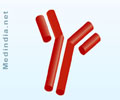Immune cells spread the word fast over an invading pathogen. This discovery by researchers at The Australian National University could mean new ways to treat cancerous tumors.
Immune cells spread the word fast over an invading foreign substance, or pathogen. This discovery by researchers at The Australian National University could mean new ways to treat cancerous tumors. It could also strengthen immunity in patients with weaker immune systems.
Professor Chris Parish and Dr Ben Quah from The John Curtin School of Medical Research led the team.“Our discovery revolutionises our understanding of how the immune system works,” said Professor Parish.
“It indicates that there is much more communication and sharing of information between cells of the immune system than was previously thought.
“These findings can potentially be harnessed to expand immunity against pathogens and cancer. In the case of cancer the number of immune cells in a patient that can recognise and eliminate the cancer could be dramatically expanded.
“Another obvious application of our discovery is in patients with decreased immunity. Again this form of cell to cell communication could be used to expand the number of immune cells in these individuals that can combat opportunistic infections,” he said.
Professor Parish added that he started research on this phenomenon in the immune system over 10 years ago.
Advertisement
“It took many years for us to obtain sufficient data to convince ourselves that the phenomenon was genuine. Now there is no doubt that the sharing of information and abilities between cells of the immune system is genuine.
Advertisement
The researchers’ innovative work on immune cells has landed them the inaugural Marshall and Warren Award from the National Health and Medical Research Council (NHMRC).
Named after Physiology and Medicine Nobel prize-winners Barry Marshall and Robin Warren, the award aims to help Australian scientists respond to the nation’s future health needs.
Professor Parish’s and Dr Quah’s breakthrough was selected as the most potentially transformative research from over 3,600 project grant applications to the NHMRC. The researchers will now receive $521,706 over three years to continue their work.
Source-Medindia








